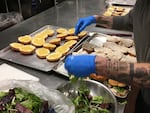
The Portland food salvage and redistribution nonprofit Milk Crate Kitchen delivers more than 100 meals to an overflow emergency shelter at Clackamas Community College on Wednesday in Oregon City, Ore. The nonprofit's founder Michael Casper said he was able to deliver the meals through icy conditions in part because of his trusty red Subaru.
Courtesy of Sherielyn Gardner
During this week’s ice storm, Michael Casper’s food redistribution nonprofit got a call from a shop in Northwest Portland that had nearly 30 pounds of extra bagels.
“It was unfit for us to drive in Northwest,” Casper, founder and co-director at Milk Crate Kitchen, said, “but we knew somebody in the Northwest corridor that could walk over there and pick them up.”
Instead of going to waste, the bagels made their way to people sheltering from the harsh weather at the nonprofit community center Friendly House.
When weather emergencies like this week’s ice storm hit, it strains resources across the region. Dangerous travel conditions and power outages force restaurant and grocery store closures, putting massive amounts of food at jeopardy of going to waste.
That’s where nonprofits like Milk Crate Kitchen — which, in a normal week, uses mostly salvaged food to prepare and deliver 300 free gourmet meals to doorsteps — step in. A network of food redistribution nonprofits across the city has been working through icy conditions this week to salvage food from closed businesses and turn it into meals. And if one organization is unable to access an area, another nonprofit may be able to fill in the gap.
On a regular week absent of snow closures, Urban Gleaners moves about 25,000 pounds of food through its warehouse. Nico Niebes, executive director of the food rescue and redistribution nonprofit, said they take donations from grocery stores, corporate cafeterias, event centers and restaurants and redistribute it at more than 40 sites across the Portland metro area.
“The pickups that we’ve been able to get out and go and get in this weather have been doubled to triple the size that those pickups normally are,” Niebes said.
That’s in part because businesses are either closed or are doing far less in sales as Portlanders shelter from frigid temperatures.

Michael Casper, the founder and co-director of the food salvage nonprofit Milk Crate Kitchen, makes sandwiches for volunteers working through the ice storm this past week in Portland, Ore. The ingredients were donated from Northeast Portland's women's sports bar, The Sports Bra, which had to close for several days due to the storm.
Courtesy of Sherielyn Gardner
This weather is horrible for restaurants and stores, Niebes said, “but it’s great that they’re able to pay it forward and get it to us. Then we can get it out so there’s no waste happening.”
Salvaged food from Urban Gleaners normally flows to free markets mostly set up at schools, Niebes said. Since the storm shuttered schools across the state, staff and volunteers worked with other nonprofits to get food collected from Urban Gleaners out to different sites.
“The most vulnerable in our population are usually the most affected by this type of weather,” Niebes said. “To be able to work with other organizations that are able to open and get food out is super crucial.”
Over the course of the storm, county officials in the Portland metro area have opened additional emergency shelters amid unprecedented need. Shelters in Multnomah County have seen record demand as temperatures sat below freezing for days. In Clackamas County, officials worked with nonprofit The Father’s Heart and Clackamas Community College to open an emergency shelter on campus to accommodate up to 50 people.
Stephanie Coleman helped run the overflow shelter at the community college in her capacity coordinating emergency planning and operations for Clackamas County Social Services. When the county decided to open up additional shelter space, Coleman jumped on the phone to get hot meals to the site.
On Wednesday afternoon, Casper from Milk Crate Kitchen prepared more than 100 meals at the facility they rent in central Portland. He then used his trusty Subaru to navigate ice coated roads and deliver the meals to the Clackamas Community College emergency shelter in Oregon City.
“They went above and beyond,” Coleman said. “They put in more meals because they said, ‘we’re not sure if you accounted for staff, so we put more meals in there so everyone could participate and have hot food.’ The guests were just so appreciative — being in a shelter condition like that, and having just a hot wonderful meal, it really lifts a lot of people’s spirits.”
Restaurants and other businesses interested in donating to food rescue organizations can connect with them on their websites.
Milk Crate Kitchen is online at milkcratekitchen.org and Urban Gleaners is at urbangleaners.org. The member-owned, volunteer-run St. John’s Food Share can also accept and distribute donated food, and can be reached at stjohnsfoodshare.org.
